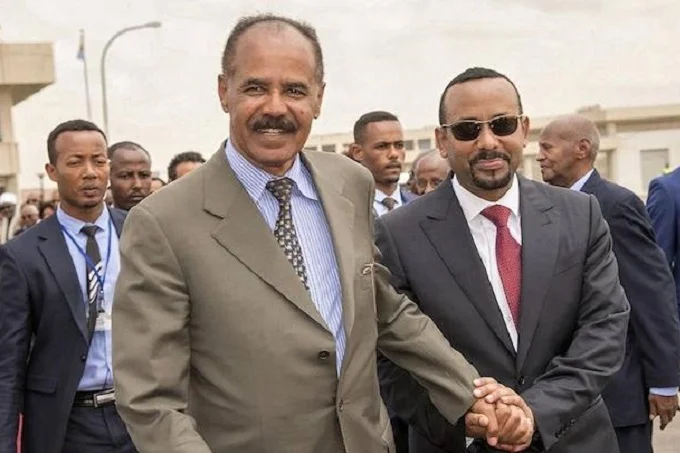Ethiopian and Eritrean leaders signed a declaration declaring that the state of war between the two countries is over, ending a 20-year-old border conflict, both countries also agreed to restore trade and diplomatic ties.
The declaration officially ending the war between the two neighboring countries came at a historic meeting between the Ethiopian and Eritrean leaders in the capital of Eritrea, Asmara.
The summit between Eritrean President Isaias Afewerki and Ethiopian Prime Minister Abiy Ahmed marked the first meeting of heads of state from neighboring countries for almost two decades. Both nations waged a brutal war from 1998 to 2000 in which at least 70,000 people were killed.
Since then, a wobbly situation has existed between the two countries, without the continuation of the war, but without peace being in place either.
Abiy was hugged by Eritrean President Isaias Afwerki at the Asmara airport, the Eritrean capital, and they smiled and laughed past the group in uniform and the guard of honour.
The friendly welcome set the tone for the visit as the two men were shown repeatedly on Eritrean public television smiling together before announcing at a banquet that relations would be normalized.
This diplomatic initiative is the latest in a series of changes introduced by Ethiopian Prime Minister Abiy Ahmed since taking office. Before that, it was unthinkable for Ethiopia to accept that Badme, the starting point of the conflict, could be part of Eritrea.
Both countries will reopen embassies, re-establish air links and allow direct phone calls. The landlocked Ethiopia will seek to use the ports of the Red Sea of Eritrea.
“We have agreed to open embassies in our respective countries, allow our people to visit other cities and allow our airlines and ports to operate freely,” said Abiy.
“Love is greater than modern weapons like tanks and missiles. Love can win hearts, and we saw many today in Asmara.”
“This agreement will radically reshape the geopolitical map of the Horn of Africa and East Africa,” said Hallelujah Lulie, a policy analyst specializing in the Horn of Africa.
“The rivalry between Ethiopia and Eritrea has been reflected in the conflicts in South Sudan, in Somalia, sometimes even in Chad.”
